
Apocalyptic and post-apocalyptic fiction is a subgenre of science fiction in which the Earth's civilization is collapsing or has collapsed. The apocalypse event may be climatic, such as runaway climate change; astronomical, an impact event; destructive, nuclear holocaust or resource depletion; medical, a pandemic, whether natural or human-caused; end time, such as the Last Judgment, Second Coming or Ragnarök; or any other scenario in which the outcome is apocalyptic, such as a zombie apocalypse, AI takeover, technological singularity, dysgenics or alien invasion.

Alien invasion or space invasion is a common feature in science fiction stories and films, in which extraterrestrial lifeforms invade Earth to exterminate and supplant human life, enslave it, harvest people for food, steal the planet's resources, or destroy the planet altogether. It can be considered as a science-fiction subgenre of the invasion literature, expanded by H. G. Wells's seminal alien invasion novel The War of the Worlds, and is a type of 'first contact' science fiction.
The concept of self-replicating spacecraft, as envisioned by mathematician John von Neumann, has been described by futurists and has been discussed across a wide breadth of hard science fiction novels and stories. Self-replicating probes are sometimes referred to as von Neumann probes. Self-replicating spacecraft would in some ways either mimic or echo the features of living organisms or viruses.
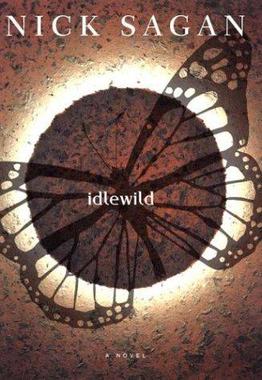
Idlewild is a science fiction novel by American writer Nick Sagan, published in 2003. It is the first of a trilogy, with sequels Edenborn and Everfree. The story is split between two settings: the middle of the 21st century and a generation later. It is a picture of the last ten people on earth, a near-complete pantheon of gods and goddesses.

Adiamante is a 1996 science fiction novel written by L. E. Modesitt, Jr. It is outside the span of his series work but maintains several of his main themes, including justification of pre-emptive force, nanotechnology, a nearly destroyed but rebuilt Earth, misuse of technology leading to man's downfall, internalized information networks, and shortening or slurring of the names of present-day cities, countries and ethnic groups, along with historical events.

Firstborn is a 2007 science fiction novel by British writers Arthur C. Clarke and Stephen Baxter. It is the third book, billed as its conclusion, of the A Time Odyssey series.

Star Guard is a science fiction novel by American writer Andre Norton, published in 1955 by Harcourt, Brace & Company. It is an example of military science fiction, based on European ancient history.

Glasshouse is a science fiction novel by British author Charles Stross, first published in 2006.

The Stars Are Ours! is a 1954 science fiction novel by American writer Andre Norton. It describes the first interstellar voyage, undertaken to escape the tyranny that rules the Earth. Norton wrote a sequel, Star Born, which was published in 1957.
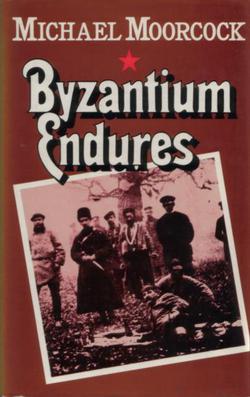
Byzantium Endures is a historical fiction novel by English author Michael Moorcock published by Secker & Warburg in 1981. It is the first in the Pyat Quartet tetralogy, and is followed by The Laughter of Carthage.
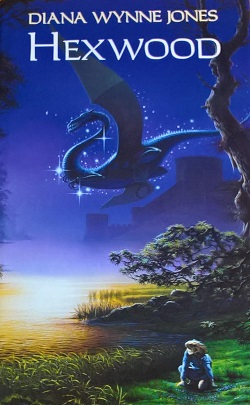
Hexwood is a 1993 fantasy/science fiction novel for young adults. It is by British author Diana Wynne Jones.
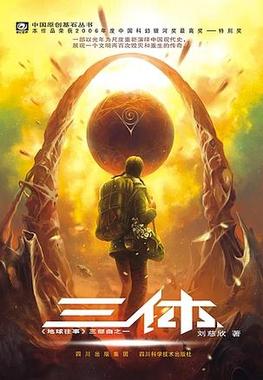
The Three-Body Problem is a 2008 novel by the Chinese science fiction author Liu Cixin. It is the first novel in the Remembrance of Earth's Past trilogy. The series portrays a fictional past, present, and future wherein Earth encounters an alien civilization from a nearby system of three Sun-like stars orbiting one another, a representative example of the three-body problem in orbital mechanics.

Terra Nostra is a 1975 novel by the Mexican writer Carlos Fuentes. The narrative covers 20 centuries of European and American culture, and prominently features the construction of El Escorial by Philip II. The title is Latin for "Our earth". The novel received the Xavier Villaurrutia Award in 1976 and the Rómulo Gallegos Prize in 1977.

Down by the River is a 1997 novel by Irish novelist Edna O'Brien. The novel depicts the response of a local community the a girl, Mary, abuse by her father being exposed to their local community when she tries to get an abortion. The ensuing legal battle in a country which bans abortions.

Ada Palmer is an American historian and writer and winner of the 2017 John W. Campbell Award for Best New Writer. Her first novel, Too Like the Lightning, was published in May 2016. The work has been well received by critics and was a finalist for the Hugo Award for Best Novel.
Terra Ignota is a quartet of science fiction and philosophical novels by the American author Ada Palmer. The series consists of Too Like the Lightning (2016), Seven Surrenders (2017), The Will to Battle (2017), and Perhaps the Stars (2021). After three centuries of a global near-utopia, a minor crime and a miracle child begin to unravel the social system and lead the world to technologically-advanced total war. The first three books cover the events leading up to the war and the final book covers the war itself. The novels have won several awards, including a 2017 Compton Crook Award. The first novel was a finalist for the 2017 Hugo Award for Best Novel, and the series as a whole was a finalist for the 2022 Hugo Award for Best Series.

The Other End of Time is a 1996 science fiction novel by American writer Frederik Pohl. It is the first novel in The Eschaton Sequence, which is about the adventures of Dan Dannerman, an American government agent of the near future who becomes involved with the discovery of advanced and warring aliens. The novel is about Dannerman and a small group of people who explore an abandoned space station, only to find themselves abducted by aliens who use them for experiments.

Too Like the Lightning is the first novel in a science fiction quartet called Terra Ignota, written by the American author Ada Palmer. It was published on May 10, 2016. Its sequels are Seven Surrenders (2017), The Will to Battle (2017), and Perhaps the Stars (2021). The novel won the 2017 Compton Crook Award. It was a finalist for the 2017 Hugo Award for Best Novel and the James Tiptree Jr Memorial Award.
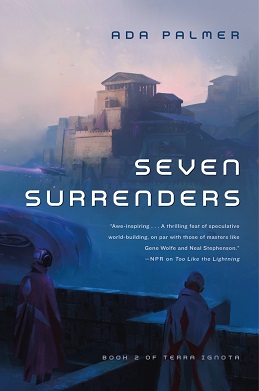
Seven Surrenders is the second novel in a science fiction quartet called Terra Ignota, written by the American author Ada Palmer. It was published on November 28, 2017. It was a finalist for the 2018 Locus Award for Best Science Fiction Novel. It is preceded by Too Like the Lightning (2016) and followed by The Will to Battle (2017) and Perhaps the Stars (2021).

The Will to Battle is the third novel in a science fiction quartet called Terra Ignota, written by the American author Ada Palmer. It was published on December 19, 2017. It was a finalist for the 2018 Locus Award for Best Science Fiction Novel. It is preceded by Too Like the Lightning (2016) and Seven Surrenders (2017). It is followed by Perhaps the Stars (2021).

















